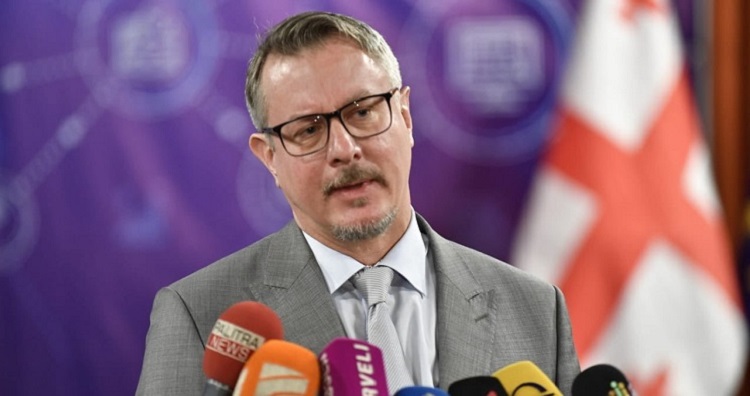EU Ambassador to Georgia: “Big and difficult” job starting as Georgia receives questionnaire

The EU Ambassador said the decision on the length of the questionnaire had been made as “this is a special time,” with the European Commission trying to ensure the membership process is sped up amid the ongoing military actions in Ukraine and threats for the Black Sea region. Photo: EU delegation to Georgia.
The “ball is in Georgia's court” on the “big and difficult” job on the path of the country’s European Union membership process, Carl Hartzell, the EU Ambassador to Georgia, said at a press conference on the handover of the membership questionnaire to Georgian authorities on Monday.
Oliver Varhelyi, the European Commissioner for Neighbourhood and Enlargement, handed over the questionnaire to Georgia’s Foreign Minister earlier in the day, and Hartzell said the development marked the time for local political forces to unite in efforts to reform and speed up the process of membership.
He also said the number of questions in the questionnaire for Georgia had been reduced compared to the cases with previous aspiring countries in order to speed up the process. The questionnaire for Georgia contains 369 questions, significantly less than ones received by other EU partners. Previously, forms including about 2,000-5,000 questions were received by countries aspiring to join the Union.
The EU Ambassador said the decision on the length of the questionnaire had been made as “this is a special time,” with the European Commission trying to ensure the membership process is sped up amid the ongoing military actions in Ukraine and threats for the Black Sea region.
“The EU has never been on such a very fast path before accession, as it is a very important, fundamental process for both the EU and the applicant country. We are currently seeing the fastest process that even the EU can carry out. We can highlight a historic moment, it is a historic moment, but at the same time there are many challenges. It is important that these perspectives are used and that the challenges that exist are overcome,” Hartzell said.
The EU official also said the moment called on Georgian political parties to “do their best and be united” to intensify Georgia's role in the world and in Europe.
After the Georgian authorities respond to the questionnaire - with a timespan of 1.5 months set for the procedure - the European Commission will prepare its report on the document and forward it to the European Council.
 Tweet
Tweet  Share
Share